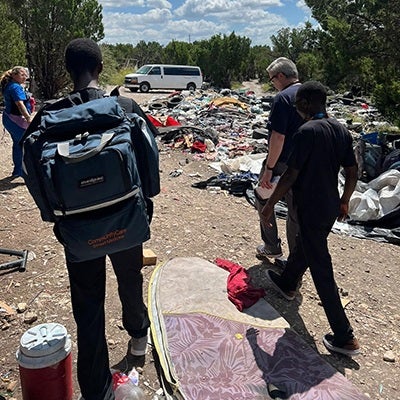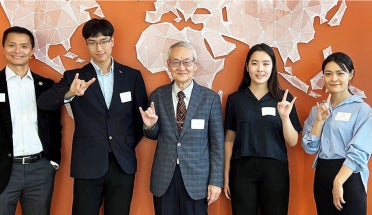
AMPATH Collaboration Builds Relationships in Kenya and Texas
- Oct 15, 2024
- Global Initiatives
- by Meredith McKelvey

When Silas Nyambega and Bryan Omondi arrived at Dell Medical School, they knew they would experience clinical rotations aided by cutting-edge technologies in areas of medicine still unfamiliar to them. What they weren’t expecting was to develop a sense of community at Dell Med in just six short weeks.
As part of this year’s bilateral exchange program between The University of Texas at Austin and Moi University in Eldoret, Kenya, medical students Nyambega and Omondi made the long journey to Austin in August 2024.
The collaboration, initiated in 2018 and facilitated by Dell Med’s Department of Population Health and Texas Global, allows students from each university to travel across the world to gain insight into novel health care systems hosted by the partner institution.
“As humans, it is important to understand that people from different places live in different ways, and appreciating this helps us to generally become better humans in the way we relate to others,” said Omondi.
Exchange for Understanding
Moi University and UT Austin are part of the Academic Model Providing Access to Healthcare (AMPATH) Consortium, a network of academic health centers that spans the globe. Sarayu Adeni, senior program coordinator for Global Health at Dell Med, said the exchange program is a key element in the AMPATH partnership.
“At the individual level, we want the students — who, at this point in their training, are building themselves up as professionals — to get a chance to have some exposure to both countries, patient populations, standards of practice and communities of practice around the world.”

To further serve this objective, the Kenyan students spent a day working with Austin’s CommUnity Care Street Medicine Clinic. Dell Med works regularly with the organization, which serves the city’s homeless population by taking physicians, students and caregivers out to encampments to treat patients at the locations where they can be found.
The outing “brings our global-health-to-local-health purpose full circle,” said Adeni. “[Practitioners from] Kenya and the U.S. can learn from each other how to serve their respective populations who are low-income, migrant and/or hard to access.”
Transformative Opportunities
During their six weeks at Dell Med, Nyambega and Omondi participated in elective clinical rotations and lectures that transformed their future paths as medical practitioners.
While attending a clinical rotation in the pediatric neurology department at Dell Med, Nyambega discovered his passion for assisting people, especially children, who struggle with neurological disorders. He hopes to practice pediatric neurology, an underserved sector of Kenya’s health care system, after graduating from Moi University.
“I would like to work in a field where you’re able to help patients recover,” said Nyambega. “Pediatric neurology is one of those fields where you can see the progress of your patients as they get better and better.”
Similarly, Omondi’s experience rotating in the cardiology department at Dell Med has shaped his goal of becoming a cardiologist.
Both students are returning to Kenya determined to use the knowledge they gained during their exchange program to give much-needed care to their communities.
Global Impact
Beyond providing students with invaluable opportunities, AMPATH’s larger goal is to tackle health inequities across the globe. The program maintains more than 300 clinical sites in western Kenya, with expansions in Nepal and Ghana, and UT serves as the lead institution for the adaptation of the AMPATH model in Mexico. Through this network, AMPATH aims to foster a global collaboration between leading researchers and medical practitioners.

The partnership between Moi University and UT Austin also encompasses more than an exchange program; faculty from Dell Medical School and the School of Nursing also travel often to Eldoret to give lectures, conduct research and perform clinical care.
“Faculty are leading these partnerships,” said Adeni. “The students are part of something larger. It’s an institution-to-institution partnership that’s being built by faculty who are also building partnerships with their Kenyan counterparts.”
Kenyan students at Moi University have seen firsthand the positive results of AMPATH’s clinics.
“There’s a lot of value in the AMPATH initiative,” said Omondi. “A lot of people in Western Kenya have benefited directly from the care that this program has afforded them. This program has also allowed a good number of students — me included — to improve their knowledge during student exchange programs.”
A New Generation
While AMPATH focuses on providing health care in Western Kenya, the program also impacts students at Dell Med in profound ways.
Roba Abousaway, third-year student at Dell Med and a Global Health student ambassador, served as a peer mentor to Nyambega and Omondi. During a global health course they attended, Abousaway was struck by the Kenyan concept of “harambe,” which describes community efforts to raise funds for medical fees.
Nyambega and Omondi explained harambe using examples from their own lives, such as witnessing a community contributing money to buy equipment for a local hospital.
“They were really our best teachers,” said Abousaway. “I feel lucky that we’re offered this opportunity. For anyone who’s interested in global health, just forming friendships, relationships with people who are coming here to learn from us, we can learn just as much from them.”

From trying food at various Austin restaurants to hiking Mount Bonnell, student ambassadors also helped Nyambega and Omondi experience life outside of clinical rotations and lectures. In doing so, they formed relationships that they hope will last for years to come — relationships that will be critical to facilitating the next generation of AMPATH faculty and practitioners.
“It’s less about the numbers — the volume of students coming in at once,” agreed Adeni. “It’s more about the quality of building these close relationships. That one-to-one connection is what we’re trying to cultivate. This is just a start.”
She concluded with a hopeful vision: “Maybe years from now, we’ll hear about our ambassador and our Kenyan student collaborating on some great initiative in research or some new intervention in health care and keeping the purpose of the partnership going.”



